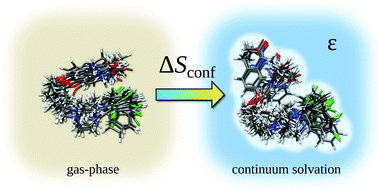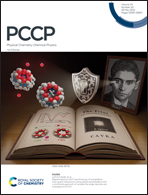Towards understanding solvation effects on the conformational entropy of non-rigid molecules†
Abstract
The absolute molecular entropy is a fundamental quantity for the accurate description of thermodynamic properties. For non-rigid molecules, a substantial part of the entropy can be attributed to a conformational contribution. Systems and properties where this is relevant, e.g., protein–ligand binding affinities or pKa values refer usually to the liquid phase. In this work, the influence of solvation on the conformational entropy is investigated. A recently introduced state-of-the-art and automated computational protocol for the computation of conformational entropies [Pracht et al., Chem. Sci., 2021, 12, 6551–6568.] is applied in combination with fast and accurate semiempirical quantum-chemical methods and implicit solvation models for a set of 25 commercially available drug molecules and five transition metal compounds. Computed gas-phase conformational entropies are compared with values obtained in implicit n-hexane and water. It is found that implicit solvation can have a substantial effect of several cal mol−1 K−1 on the entropy as a result of large conformational changes in the different phases. We conclude that for flexible molecules chemical accuracy for free energies in solution can only be achieved if solvation effects on the conformational ensemble are considered.



 Please wait while we load your content...
Please wait while we load your content...